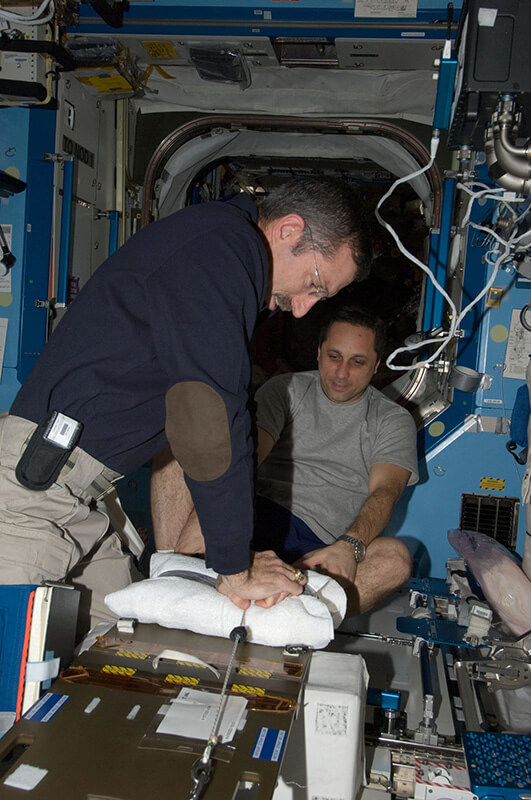Despite an extensive range of variables, for hundreds of years, medical practitioners and researchers have been able to rely on at least one undeniable constant—gravity.
That all changed in 1961 when Russian cosmonaut Yuri Gagarin became the first human to leave Earth’s atmosphere. The age of space medicine was upon us.
Though sensors and video monitoring sent back plenty of basic medical data from early astronauts and cosmonauts, an in-depth in-space study of the human body was not really a priority until Dr. Joseph Kerwin, America’s first space doctor, traveled to Skylab in 1973.
Yet from the beginning, the effects on the human body from spaceflight were clear.
Thanks to the lack of gravity, bone density loss, like decreased muscle mass, was unavoidable. In a condition now officially called ‘spaceflight osteopenia’, Russian cosmonauts lost up to 20 percent of their bone mass during early space station stays.
The human immune system began functioning at lower levels, leading to a higher infection risk (studies have shown some viruses adapt to spacelight and can become virulent), while a big increase in the exposure to the sun’s radiation was a clear hazard that would require addressing.
People think science we do on the space station only relates to space exploration. They don’t realize how much it matters to medical care [for] everyday living, here on Earth.
However limited, solutions to some problems have been developed over the last few decades. Exercise in space—up to two and a half hours every day—is now mandatory for all astronauts, yet other issues will require more work, especially as the likelihood of deep space missions to Mars and beyond increase over the next few decades.
“I think the biggest health challenges—certainly for exploration-class missions, longer and longer missions—number one is radiation,” Dr. Serena Auñón-Chancellor, a NASA astronaut and physician who traveled to the International Space Station (ISS) in 2018, told Scientific American.
“We’re pretty well protected on the ISS – the thick shielding of the vehicle, Earth’s magnetic field, and the atmosphere all provide protection. Once you change that baseline standard—with a different vehicle, maybe thinner shielding, no atmosphere—your exposure is greater. And you’re at more risk for solar particle events on a long transit, let’s say to Mars.
“Continuing bone loss is also a concern. How do we mitigate that? The exercise devices we have on the station are big. We love them, but can we take something that large on the next vehicle? Probably not. So we’re looking at devices to use on the vehicles that are going to take us farther out.
“Then we have the effects on the eyes—the issues that we’ve seen with changes in the shape of the eyeball itself, swelling of the optic nerve, changes in vision. I did not experience any of those, but, certainly, we’ve had other astronauts that have.
“So it’s something we’re tracking; we’re trying to figure out how to predict and then how we can treat it if it does pop up.”
Beyond the negative effects on those who travel to the heavens, the advantages of spaceflight, and space medicine, for those who don’t, have been dramatic.
From MRI and CAT scans to pacemakers and kidney dialysis machines, a range of medical fields have benefitted from NASA studies and technology over the years. During her flight in 2018, Dr. Auñón-Chancellor spent significant time on a study into endothelial cells in microgravity, which could have positive ramifications in creating chemotherapy agents.
“People think science we do on the space station only relates to space exploration,” Dr. Auñón-Chancellor told CNET last year. “They don’t realize how much it matters to medical care [for] everyday living, here on Earth.”
Help can head in the opposite direction too, with a medical start-up from Nebraska developing a “fist-sized robot in conjunction with NASA that may be able to perform abdominal laparoscopic surgery” in space.
Fortunately, astronauts have never had to deal with a medical emergency on that scale before, but it certainly provides a level of reassurance higher than when early Mercury flyers were sent into space equipped with little more than syringes designed to deliver medicine for motion sickness or a vasoconstrictor for treating shock.
“Space medicine is often similar to telemedicine, with more communication issues,” NASA flight surgeon Richard Scheuring told The DO in 2018.
Perhaps the most celebrated space medicine study ever was NASA’s famed ‘Twins Study’ in 2015 and 2016. Astronaut Scott Kelly spent a year aboard the ISS, while his brother Mark, also an astronaut, stayed back on Earth.
From the effects of aging in space, eyesight issues, and changes to Scott Kelly’s gene make-up, the study provided an incredible data set never before seen in nearly 60 years of space travel.
“My focus has always been how do we translate this back to care for Grandma and spin it off back to the planet,” Scott Dulchavsky, who led the ‘Twins Study’, told CNBC.
“Observing what works for astronauts can potentially help people of advancing age and with spinal debilitations on Earth.”
From getting astronauts to Mars and keeping them healthy while they’re there, to helping folks back on Earth, the age of space medicine looks set to be entering a phase of real importance.
The next few decades in the field will be fascinating to follow.



